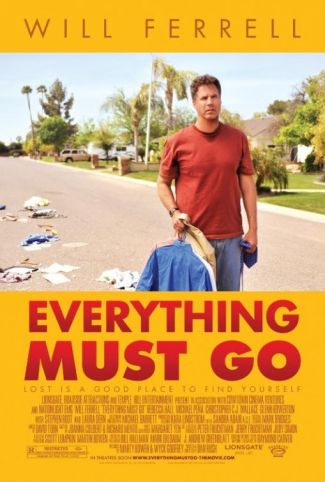Everything Must Go
(Reviewed June 9, 2011)
|
| Rating: |

|
|
|
Order this DVD or Blu-ray through Amazon.com
|
Americans must have something of a love-hate relationship with their material goods. Just look at how they routinely refer to them collectively by using a common vulgarism for excrement. In Everything Must Go by Dan Rush, which is (very loosely) based on a Raymond Carver short story ("Why Don’t You Dance?"), Nick, the hero, played by Will Farrell, is fired from his job and comes home to his pleasant Phoenix suburb to find that his wife has left him, changed the locks on the doors of his house and deposited all his belongings on the front lawn. At first he retains his "normal" attitude to the relics of his life spread out before him: "This is my corner," he says, "I’m not leaving my stuff." But eventually he takes a certain pride in selling it all, or nearly all, in a gigantic yard sale. We hear him on the phone to his wife’s voice-mail — she refuses to speak to him — telling her that "I’m selling all my stuff, my crap," as if this might persuade her to give him another chance.
Yet Mr Rush, a director of commercials making his first feature film, doesn’t quite persuade us. Even at the moment when Nick first sees his crap on the lawn, we sense something a little off about this scenario. Aren’t these things Mrs Nick’s belongings too? It seems odd, to say the least, that a couple who have apparently been together for some years and have a joint bank account (which she has also shut him out of) should still think of the furniture in their shared home as his ‘n’ hers. Or that she should have gone to all the trouble of putting his stuff outside before abandoning the house altogether. The wife never appears in the movie, remaining a distant but malign presence throughout, but her breaking up of the matrimonial home into Nick’s crap and (presumably) the crap that, along with other things, Nick no longer has access to seems a shade too literal — as if she shared with Mr Rush a Shakespearean ambition to present us with Nick, like Poor Tom on the heath in King Lear, as "unaccommodated man."
Part of the problem lies in our latter-day ideas of what it means to be accommodated. Nick, for instance, is a recovering alcoholic whose recent backsliding during a business meeting in Denver — which was also the occasion for a tryst with a floozy — is what has proven the last straw both for his boss (Glenn Howerton) and his wife. There must inevitably be some significance, then, to the fact that the selling of the crap is motivated in the first instance by his need to get money for beer. The exchange of the ordinary trappings of middle-class existence for that which has already jeopardized that existence is just a little bit pat. Rather confusingly, although his addiction is the accommodation to which he returns as for comfort and reassurance in midst of the disaster it has created for him, it also gives him, along with what he has paid for it, a certain moral authority in his dealings with others.
Principal among these is a new neighbor named Samantha (Rebecca Hall) who at first offers him help but eventually proves to be even more vulnerable and unaccommodated than he is. The only other characters in Carver’s short story are a young couple trying to furnish a house, but Mr Rush sees a greater potential in partially fracturing the domestic contrast to Nick’s own shattered existence. Samantha, pregnant with her first child, has moved to the neighborhood ahead of her husband and is spooked by Nick’s forlorn image of abandonment and loneliness — a feeling that he does his best to exacerbate. As if the point were in danger of being lost, he also looks up an old high school classmate, played by Laura Dern, who is now a divorced single mother with a philosophical approach to living solitary and living hard.
The other characters include a neighbor boy, played by Christopher Jordan Wallace, who also becomes a protégé, learning the art of salesmanship and a bit of baseball glove-technique under Nick’s tutelage in exchange for helping with the yard sale, and a police detective (Michael Pe a) who is his AA sponsor. Neither adds much to the central and poignant tableau of a man shedding his material carapace and, with it, his place in his community for the sake of an illusion of personal authenticity — though Mr Rush may also believe in this illusion. Both these characters, together with a plot twist that I forbear to reveal are meant, I take it, in very different ways to hint at a happier future for Nick once he’s got rid of that bitch of a wife of his, but this is a mistake. It is too easy and sentimental a way to end the story. Maybe the only alternative was not to end it at all but just to walk off the stage, as the wife herself has already done. That, after all, is what Carver did but what Dan Rush can’t bring himself to do. 
[Top][Back]
|



